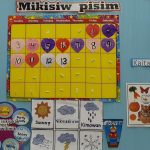Earth Day and Beyond: Our Water
On April 22, people across the world will celebrate Earth Day. There will be demonstrations, guest speakers, and schools may encourage learners to have a trash-free day or bring a plant home.
While these are worthwhile activities, we can and should do more. We can do more every day. We cannot only care for our environment on Earth Day.
Water Protectors
For years, Indigenous women have been telling us about the state of our water. They have warned us about the pollution leaching in by accident or dumped on purpose. They have warned us about disrupting the flow of water across this land. Indigenous women have asserted their right to clean drinking water and advocated for more than 100 communities still under boil water advisories.
Women’s Connection to Water in Indigenous Worldviews
Women have a close connection and relationship with water in many Indigenous worldviews. They often take on the role of caretaker or protector. This is why women often spearhead movements like Idle No More and Mother Earth Water Walk.
Traditional Knowledge
In her article “Aboriginal Women, Water and Health: Reflections from Eleven First Nations, Inuit, and Métis Grandmothers,” Kim Anderson speaks with Grandmothers from different Nations across Turtle Island. Many of the women she speaks with talk about how water can be seen as the life-blood of the Earth. Just as our bodies have veins and arteries which carry blood, the rivers and streams carry water through the land. Most of the Earth’s surface is water, just as our bodies are mostly water. We can form reciprocal relationships with water. The Grandmothers’ Traditional Knowledge tells us that water will take care of us if we take care of it. Water can provide humans with food, hydration, transportation, medicine, and other necessities. But water cannot just keep giving without us offering something in return. We need to take care of it, keep it clean, and thank it for helping us.
Water is not a resource. It is our sibling.
Clean Water Advocacy
In the following resource, created in collaboration with Seven Generations High School, we hear Laura Horton from Manitou Rapids talk about her own advocacy journey for clean water.
Water Is the Basis of All Life
As Laura tells us, water is not replaceable. Once the water we have is gone, it will be gone forever. The water Laura is protecting is the basis of life on our planet. Animals and plants all need water to live. They need water to support their habitats and for drinking. When this water is not clean, plants change beyond recognition or die, and animals leave to find cleaner water sources. If the animals can’t leave, they mutate or carry poisons in their bodies that affect others higher up on the food chain, including humans.
As pollution affects our waters, we have to be more careful about our food choices, especially fish. We need to add more and more chemicals to our water to make sure it is drinkable. Finally, when the water becomes too polluted to drink, we need to bring water in from other parts of the country, which creates its own toll on the environment.
Take Action to Protect Our Waters
So, based on the Traditional Knowledge of these women, what can we do to protect our waters? We can walk for them. We can pray for them. We can lay down tobacco for them. We can raise our voices for them.
Above all, we can take action in our own lives to get to know the waters around us and to clean them up.
- Organize clean-ups every spring and fall.
- Connect with Water Walkers and Elders in or near your community.
- Take part in demonstrations and protests year-round that advocate for our water.
- Walk along the waterways in your community to form your own relationship.
- Commit to reducing your household waste permanently, a little bit at a time.
That should be our goal this Earth Day and every day.








